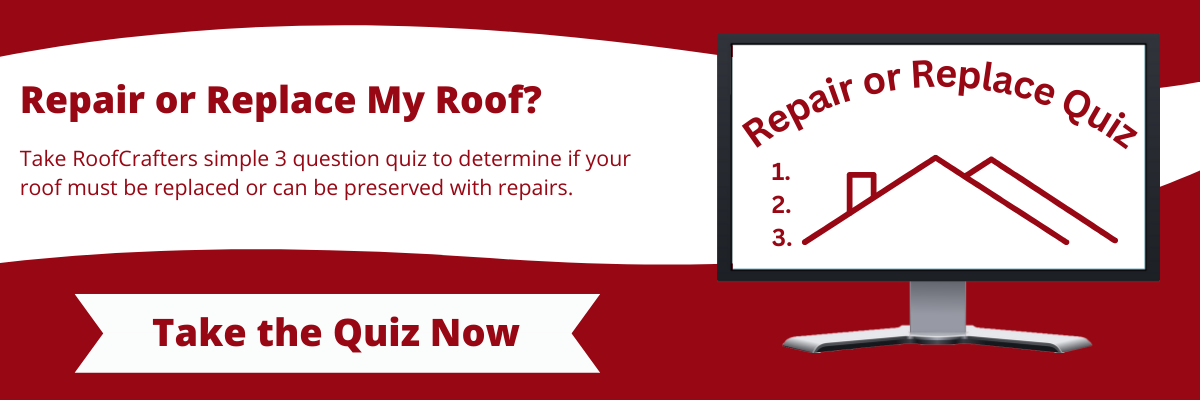What Should I Do If My Roof Is Leaking?
December , 2023 | 8 min. read

If there's anything that we Floridians can count on every summer, it's that the rainy season is bound to wreak havoc. If you’ve ever stumbled upon a roof leak after a big storm and been sent into a sheer state of panic, don’t worry, you’re not alone. Thousands of homes are damaged each summer from wind and rain alone in the Sunshine State. Ironic, isn't it?
Anxiety in a situation like this is a natural response because you know that leaks can be indicative of underlying issues in your home’s structure, which can be dangerous to your family and property. At RoofCrafters, we resonate with your roof-leak-related anxiety. Over the past 28 years, we’ve seen just how ugly these things can get.
Not only can the repair process be stressful, but knowing what you as a homeowner need to be doing in the meantime can cause some apprehension. That’s why we’ve taken it upon ourselves to write you this guide. Here, you’ll learn what to do if your roof is leaking while you wait for a roofing expert, what causes roof leaks, and how you can prevent them. Let's jump right in!
What Should I Do If My Roof Is Leaking?
Roof leaks are most likely to occur during a rainstorm, which can be a mess to deal with because the water makes its way inside your home at a steady pace, leaving you to scramble for pots and pans to catch the water. We’ve all been there!
There are 5 things you can do in the meantime while you wait for the rain to let up:
1. Cut Off the Power
If the water is leaking near any conduits and/or electricity, cut off the power as soon as you notice a leak to avoid fires, short circuits, and prevent electrocution. The last thing you need is a roof leak and a fire.
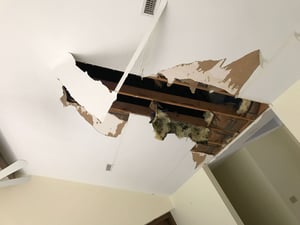
2. Save Your Possessions
It’s safe to say you’re already having a bad enough day. If you want to prevent it from getting worse, move your possessions to another room. This includes:
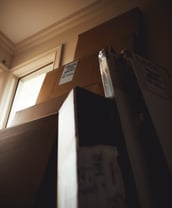
-
Furniture
-
Electronics
-
Clothing
It’s important to remember that water damage can destroy many things and void most warranties. Be sure to relocate your things to a different part of the home, or to a friend or family member's home as soon as you can.
3. Collect the Water
The last thing you want is for the water to find its way to unaffected rooms and wreak havoc there. So, use a bucket to collect the water and keep emptying it outside to prevent overflows.

When you empty the bucket, make sure to replace it with another one so that your home doesn’t get flooded in the meantime. Man, and to think you thought your day job was over!
4. Clean Up
Don’t wait before wiping up any standing water that is inside your home. Take mops and rags to wipe up the water to prevent it from seeping into your floor and damaging your home’s foundation.
5. Call a Professional
Once you have averted the crisis to the best of your abilities, get on the line with a professional roofing contractor. Even if the leak subsides after a while, there is a high probability that it will cause permanent damage to your home if you don’t take immediate action.
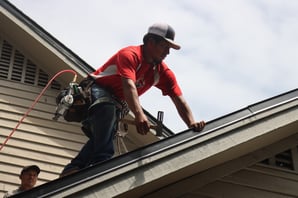
Always contact a reliable contractor who knows what they’re doing because any compromises on your roof’s maintenance or installation can be dangerous for your home and your family. Delaying repairs can worsen things and might warrant an expensive roof replacement instead of a simple repair. The water can seep into different parts of the roof and cause more leaks or cause it to collapse in extreme situations. So, get that contractor on the line ASAP.
While you wait for the contractor to fix your roof, you should take preventative measures to prevent further damage. If you have identified the leak, cover it up with a large plastic sheet and tarp. Ensure that the tarp is significantly larger than the hole in the roof to prevent more water from entering your home.
Common Causes of Leaks
Roof leaks commonly occur because of several different reasons, including:
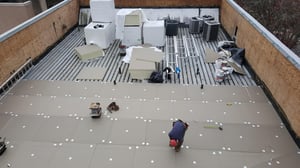
- Water may have pooled because of a storm that eventually damaged the roof, causing it to leak.
- You may have skipped roof maintenance or conducted repairs yourself.
- An impact from a tree limb may have damaged your roof.
- Your roof has reached the end of its life, and you need a new one.
- The contractor did not install the roof properly.
Although many of these occurrences are out of your control, there are some precautionary measures that you can take in order to prevent roof leaks.
How Do I Prevent Roof Leaks?
Preventing roof leaks can be as simple as keeping a lookout for anything out of the ordinary and getting routine maintenance. How else can you keep those pesky leaks away?
1. Be Proactive, Not Reactive
We’ve all heard this one before, but being proactive is extremely important to roof maintenance. Set up a maintenance schedule and follow up with frequent visual inspections of your roof.
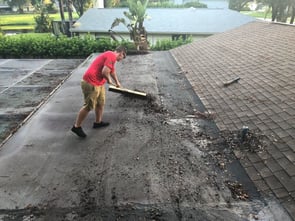
While it might save you some money to conduct inspections yourself, we do not encourage it. An experienced contractor knows the tell-tale signs that cause common roof leaks and can help you diagnose the problem. By misdiagnosing or missing out on important signs, you will end up spending more money down the road on repairs.
2. Always Call a Contractor for Repairs
Roofing is a highly specialized job, and you should never attempt to repair a faulty roof yourself. A contractor saves you money in the long run by conducting repairs effectively.
3. Never Install a Roof Yourself
Some of the most common causes of roof leaks are installation-related. If you hired an inexperienced contractor or installed the roof on your own, then there are chances that your skylight or your roof’s seams might not be adequately aligned, causing roof leaks.
4. Pick the Right Roof for Your Needs
It is imperative to choose the roof that suits your needs because choosing the wrong roof leads to high repair costs. Factors such as material, the roof slope, and your use of the roof can greatly impact which roof is the right one for you.
Can I Fix My Leaky Roof?
Absolutely! After reading this guide, you’re basically a roof leak guru. You now know the ins and outs of what causes roof leaks, how to prevent them, and how to maintain them while you wait for your roofing expert to come out and have a look. It's not so stressful after all. To continue your education on your leaky roof, check out our article: "How Much Does it Cost to Fix a Leaky Roof?"
In the meantime of brushing up on your roofing education, know that when you drop us a line, we will send one of our highly trained estimators to your home to help you with your roof emergency, and explain all of the available options. Don’t run the risk of further roof damage by waiting, schedule an inspection today.
My name is Cassie, and I’m the Content Manager here at RoofCrafters. I was born and raised in Chicago, Illinois, and made my way out to Florida post-college graduation. I’m incredibly passionate about writing and creating valuable content that helps others with the collaboration of my marketing team. When I’m not working, I enjoy shopping (a little too much), spending time at the beach, and reading!



